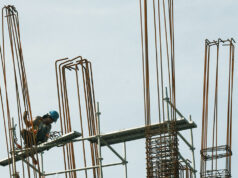CONSUMPTION will remain the economy’s main prop amid global headwinds and calamities, with investment remaining clouded due to uncertainty surrounding corporate tax reform and regulated industries like water, participants at a First Metro Investment Corp. (FMIC) briefing said.
At FMIC’s Economic and Capital Markets Briefing, the firm’s chairman Francisco M. Sebastian said: “What held us together last year is consumption,” adding that the next few years could be the “great decade of Filipino consumers” due to lower unemployment, underemployment and poverty rates.
The Philippine Statistics Authority (PSA) said the poverty incidence among families dropped to 16.1% in the first half of 2018 from 22.2% three years earlier, bringing it closer to a poverty rate of about 14% targeted by the government when its term expires in 2022. This target was recently adjusted to 11%.
Unemployment and underemployment rates are also at record lows of 4.5% and 13%, respectively.
FMIC, the investment banking unit of the Metro Bank Group, estimates gross domestic product (GDP) growth of 6.2-6.6% in 2020, supported by the government’s plan to bring infrastructure spending to the equivalent of 5.7% of GDP, as well as robust consumption.
This forecast estimate compares to the 5.6% average growth in the first three quarters of 2019 and the 6.2% seen for the full year 2018. The forecast also fits well within the 6.5-7.5% target growth of the government until 2022.
“We have seen the acceleration in the national government spending expanding in the third quarter and we are also seeing actual bigger-ticket items are going full steam ahead,” University of Asia and the Pacific professor Victor A. Abola said.
Mr. Abola said he expects price movements in major commodities in 2020 “to remain very close” to the 2.5% average inflation level seen in 2019. FMIC has a forecast range of 2.5-2.8% for this year, also well within the central bank’s forecast range of 2-4%.
“(Bangko Sentral ng Pilipinas) Governor (Benjamin E.) Diokno spoke of the Goldilocks economy, which is an economy that is growing without inflation,” he said.
Mr. Abola said foreign direct investment (FDI) likely declined in 2019 based on data available as of October.
Preliminary BSP (Bangko Sentral ng Pilipinas) data show that FDI net inflows fell 32.8% to $5.79 billion during the 10 months to October.
He said FDI was pressured by uncertainty due to the lack of finality surrounding a major tax reform bill, known as CITIRA (Corporate Income Tax Incentives Rationalization Act).
“It’s a pity because we are seeing a lot of FDIs moving from China towards Vietnam and Indonesia,” he said, noting that Vietnam’s nine-month total edged up to $25 billion.
Asked about the government’s contract dispute with its water service providers and its possible impact on FDI, Mr. Sebastian said: “I think the questions surrounding the concessions will get more people more thoughtful on how contracts will be written in the future…”
“We think that over the long run, these public-private partnerships are very attractive. I think in the end, we’re optimistic that a solution will be found,” he added.
In November, the BSP downgraded its FDI target for 2019 to $6.8 billion from the initial $9 billion target released in May.
Mr. Abola said the ongoing activity at Taal Volcano is unlikely to result in a major hit to the economy.
“I compare it to the typhoons that hit us. And the fortunate thing here is that it’s very localized, compared to typhoons which cover many provinces,” he said.
Mr. Abola added he is positive that the tensions between the US and Iran will not escalate, containing the risk from higher oil prices.
“(There was an initial) knee-jerk reaction in the markets after the killing of the (Iranian) general. Of course it creates tension in the area but there are many willing producers like for example Russia,” he said, noting that a worst-case scenario of $90 per barrel of crude is unlikely.
Mr. Abola said that an upgrade to the sovereign credit rating may only happen once growth is sustained at 7%.
“For us to think of this… within a couple of years, I think maybe our energies should (go into) addressing real issues that could accelerate our growth beyond the 7%,” he told reporters on the sidelines of the briefing.
In May S&P Global Ratings raised the country’s long-term sovereign credit rating to “BBB+” from “BBB,” bringing it one notch away from an “A”-level rating.
The government is targeting another credit rating upgrade to offset the loss of access to concessional financing rates as the Philippines is reclassified as an upper middle-income country sometime this year. — Luz Wendy T. Noble



